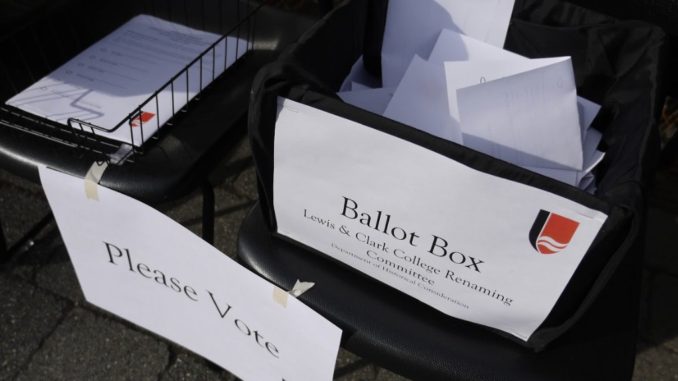
By Nico Farrell
A faux voting booth, labeled as if it belonged to an official Department of Historical Consideration, led students to fill out 119 ballots next to J.R. Howard Hall on Oct. 3. These ballots, which asked students to choose among new names for the college, were designed and placed by a student acting independently in an effort to increase participation in discussions about the name and history of the institution.
“I wanted to gauge the student voice about a topic that I feel passionately about, but trying to remove my voice as much as possible,” said Will Sarvis ’19, who created the ballots after talking with students about the history of the college and its namesakes at a tabling session in the same location on Oct. 1. Several student groups in past years, including Lewis & Clark Black Lives Matter, have criticized the name of the college by arguing that the Lewis and Clark expedition is connected to slavery and settler colonialism.
“William Clark had a slave named York, and after the journey York requested his freedom, after countless contributions and decisions on the journey, or at the very least to be near his wife,” Sarvis said. “Both of those requests were denied, and he was sold back into slavery, not near his wife.”
Andrew McPheeters, Interim Dean of Students, confirmed that the Department of Historical Consideration named by Sarvis’ ballots does not exist, and that the college does not have any formal effort underway regarding the name of the college. He agreed, however, that thinking about the history of the institution is important.
“I think we would push away from a predetermined action and think about the big picture,” McPheeters said. “If you spoke to your alumni community, there are people who deeply care about the issues that this touches on, but they would say that there are other ways to address this history. For example, if you kept ‘Lewis & Clark’ but you decided that there was some kind of symposium that needed to be had that explored these kinds of issues.”
McPheeters highlighted that the college has already taken some actions toward reckoning with history, including the creation of a statue of York and the recent development of a statement about the history of the land the college is built on. This statement, called a Land Acknowledgement, was read at Convocation and at the beginning of the Presidential Inauguration. McPheeters also questioned whether a ballot falsely claiming to be official is the right type of action for students to take.
“I think it’s important to have a conversation,” McPheeters said. “This doesn’t look like a conversation.”
Sarvis defended the effectiveness of his project, saying that he heard many students having debates about the meaning and value of the college’s name. He noted that there was substantial disagreement among the ballots, with 86 of the 119 completed ballots indicating support for a name other than Lewis & Clark, but no option gaining a majority.
“I wanted it to be seen as real because I wanted that to really cause conversation,” Sarvis said. “I have felt like in the time that I’ve been here, there’s been a sustained questioning of the college’s institutional history, but I also need to recognize that that’s been within a specific cohort of students and professors.”
He added that, while the project fulfilled an assignment for an art class, it was primarily driven by a desire to expand this debate, using an impersonation of an official department to increase participation in the conversation and yield a greater impact.
“I’m going to meet with (LC President) Wim (Wiewel), and tell him that people voted, and give him the results, and tell him this is what people voted for, that a lot of people are really interested in reckoning with the school’s history,” Sarvis said.
President Wiewel has previously expressed support for acknowledging the true history of Meriwether Lewis and William Clark, including during his inaugural address on Oct. 5.
“Even as we honor our namesakes for their exploration and discovery, we acknowledge that the Lewis and Clark expedition was one of many factors that ultimately drove the tribes and the nations of the Oregon Country from their lands,” Wiewel said during his inaugural speech. “Truth, even when it hits hard and close to home, must be acknowledged.”
Sarvis said that other courses of action could turn out to be better choices than renaming the college. “I don’t think I should be making that decision at all,” Sarvis said. “That’s part of the reason I wanted to do the project. But what I do know is that we need to take into consideration the past of the school, for the present and the future.”
Subscribe to the Mossy Log Newsletter
Stay up to date with the goings-on at Lewis & Clark! Get the top stories or your favorite section delivered to your inbox whenever we release a new issue.

Leave a Reply